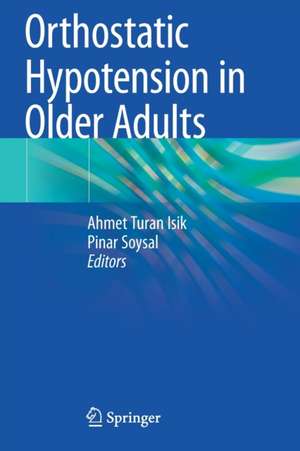Orthostatic Hypotension in Older Adults
Editat de Ahmet Turan Isik, Pinar Soysalen Limba Engleză Paperback – 23 dec 2021
The homeostatic ability to maintain blood pressure while standing requires an adequate blood volume and the integrity of the nervous system, heart, blood vessels and muscle pump. However, in older adults, some age-related factors can contribute to the development of OH. For example, decreased baroreflex sensitivity, α-1-adrenergic vasoconstrictor response to sympathetic stimuli, parasympathetic activity, renal salt and water conservation, increased vascular stiffness and decreased ventricular diastolic filling, as well as concentrated capacities of the kidney may be associated with changes in postural blood pressure. It has also been shown that OH is associated with falls, cardiac events, heart failure, stroke, reduced quality of life, and increased risk of overall mortality in these patients.
“Orthostatic Hypotension in Older Adults” will be of considerable interest to all professionals working in the fields of geriatrics, geriatric psychiatry, neurology, internal medicine, cardiology, and emergency medicine, or working with older people in hospitals or in their community.
| Toate formatele și edițiile | Preț | Express |
|---|---|---|
| Paperback (1) | 708.23 lei 6-8 săpt. | |
| Springer International Publishing – 23 dec 2021 | 708.23 lei 6-8 săpt. | |
| Hardback (1) | 1028.99 lei 3-5 săpt. | |
| Springer International Publishing – 22 dec 2020 | 1028.99 lei 3-5 săpt. |
Preț: 708.23 lei
Preț vechi: 745.50 lei
-5% Nou
135.52€ • 141.85$ • 112.80£
Carte tipărită la comandă
Livrare economică 31 martie-14 aprilie
Specificații
ISBN-10: 3030624951
Pagini: 148
Ilustrații: VIII, 148 p. 11 illus., 10 illus. in color.
Dimensiuni: 155 x 235 x 13 mm
Greutate: 0.23 kg
Ediția:1st ed. 2021
Editura: Springer International Publishing
Colecția Springer
Locul publicării:Cham, Switzerland
Cuprins
Recenzii
Notă biografică
Prof. Ahmet Turan ISIK is an internist and geriatrician. He has pursued postgraduate studies, both in Turkey and abroad, on cognitive disorders and dementia syndromes. He is currently serving as Head of the Department of Geriatrics at Dokuz Eylul University Medical Faculty, and is Director of the Brain Aging and Dementia Unit in Izmir, Turkey. He primarily studies cognitive impairment, dementia syndromes, orthostatic hypotension, and drug adverse events in older adults. His research interests are reflected in his wide range of publications in various national and international journals. He is also author of several national and international books.
Dr. Pinar Soysal is an Associate Professor of Geriatric Medicine at Bezmialem Vakif University, Istanbul, Turkey. After completing her degree in Medicine at Kocaeli University School of Medicine, she served as a Fellow of Internal Medicine at Bezmialem Vakif University (2007-2011), a Specialist in Internal Medicine at Van Ercis State Hospital, Van, Turkey (2012-2013), and as a Fellow of Geriatric Medicine at Dokuz Eylul University School of Medicine (2013-2016). She also worked at the Geriatric Center of Kayseri Education and Research Hospital, Kayseri, Turkey (2016-2018).
Textul de pe ultima copertă
This book provides a comprehensive and practical guide to orthostatic hypotension (OH) for doctors and nurses involved in the care of older adults, together with a state-of-the-art update on OH, covering its epidemiology, pathophysiology, assessment, diagnosis, causes, prevention, management, and relevance for geriatric practice. In addition, it addresses mechanisms of orthostatic tolerance and other orthostasis related conditions, as well as drugs, comorbidities and geriatric syndromes related to OH.
Caracteristici
Provides a state-of-the-art update on Orthostatic Hypotension
Shows how age-related factors can contribute to the development of Orthostatic Hypotension
Descriere
This book provides a comprehensive and practical guide to orthostatic hypotension (OH) for doctors and nurses involved in the care of older adults, together with a state-of-the-art update on OH, covering its epidemiology, pathophysiology, assessment, diagnosis, causes, prevention, management, and relevance for geriatric practice. In addition, it addresses mechanisms of orthostatic tolerance and other orthostasis related conditions, as well as drugs, comorbidities and geriatric syndromes related to OH.
The homeostatic ability to maintain blood pressure while standing requires an adequate blood volume and the integrity of the nervous system, heart, blood vessels and muscle pump. However, in older adults, some age-related factors can contribute to the development of OH. For example, decreased baroreflex sensitivity, α-1-adrenergic vasoconstrictor response to sympathetic stimuli, parasympathetic activity, renal salt and water conservation, increased vascular stiffness and decreased ventricular diastolic filling, as well as concentrated capacities of the kidney may be associated with changes in postural blood pressure. It has also been shown that OH is associated with falls, cardiac events, heart failure, stroke, reduced quality of life, and increased risk of overall mortality in these patients.
“Orthostatic Hypotension in Older Adults” will be of considerable interest to all professionals working in the fields of geriatrics, geriatric psychiatry, neurology, internal medicine, cardiology, and emergency medicine, or working with older people in hospitals or in their community.
